PSEUDOEPHEDRINE/LORATADINE 24-HOUR TABLET - ORAL
PHONETIC PRONUNCIATION: (lor-AT-uh-deen/sue-doh-eff-ED-rin)
COMMON BRAND NAME(S): Claritin-D
GENERIC NAME(S): loratadine/pseudoephedrine sulfate
Uses
USES: Loratadine is an antihistamine which provides relief of seasonal allergy symptoms such as watery and itching eyes, runny nose, and sneezing. Pseudoephedrine is a decongestant which helps relieve a stuffy nose, promotes sinus draining, and improves breathing. This medication is not recommended for use in children under 12 years of age due to the high amount of pseudoephedrine.
How to use PSEUDOEPHEDRINE/LORATADINE 24-HOUR TABLET - ORAL
HOW TO USE: Take this medication by mouth usually once daily; or take as directed by your doctor. Take with a full glass of water. Do not crush or chew this medication. Doing so can release all of the drug at once, increasing the risk of side effects. Also, do not split the tablets unless they have a score line and your doctor or pharmacist tells you to do so. Swallow the whole or split tablet without crushing or chewing. Do not increase your dose or take this more often than directed. Do not take this medication for several days before allergy testing since test results can be affected. Consult your doctor or pharmacist for more information.
Side Effects
Precautions
Interactions
Overdose
Images
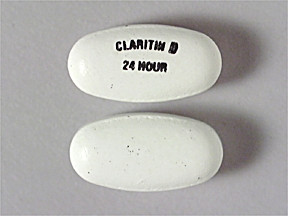
- color
- white
- shape
- oblong
- imprint
- CLARITIN-D 24 HOUR
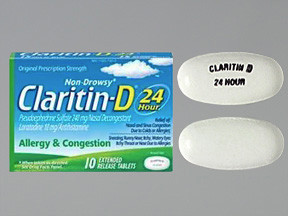
- color
- white
- shape
- oblong
- imprint
- CLARITIN-D 24 HOUR
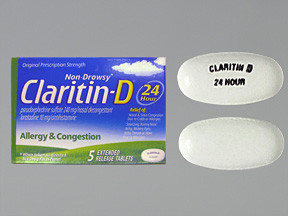
- color
- white
- shape
- oblong
- imprint
- CLARITIN-D 24 HOUR
Reviews
Faq for PSEUDOEPHEDRINE/LORATADINE 24-HOUR TABLET - ORAL
Pseudoephedrine/Loratadine 24-hour tablet is a medication that contains a combination of pseudoephedrine and loratadine. Pseudoephedrine is a decongestant that helps relieve nasal congestion, while loratadine is an antihistamine that helps relieve allergy symptoms such as sneezing, itchy or watery eyes, and runny nose.
Pseudoephedrine/Loratadine 24-hour tablet works by reducing inflammation in the nasal passages and blocking the effects of histamine, a substance released during allergic reactions.
Pseudoephedrine/Loratadine 24-hour tablet is used to temporarily relieve symptoms of allergies, such as nasal congestion, sneezing, runny nose, and itchy or watery eyes.
It is important to consult with your doctor before taking Pseudoephedrine/Loratadine 24-hour tablet if you have high blood pressure. Pseudoephedrine can increase blood pressure and may not be suitable for individuals with hypertension.
Common side effects of Pseudoephedrine/Loratadine 24-hour tablet may include dry mouth, headache, dizziness, upset stomach, and trouble sleeping. If you experience severe side effects or an allergic reaction, seek medical attention immediately.
It is not recommended to take Pseudoephedrine/Loratadine 24-hour tablet during pregnancy or while breastfeeding without consulting your doctor first. Pseudoephedrine may pass into breast milk and may have adverse effects on a nursing baby.
Pseudoephedrine/Loratadine 24-hour tablet usually starts working within 1 to 2 hours after taking a dose. However, individual response may vary.
It is important to inform your doctor or pharmacist about all other medications you are currently taking, including prescription, over-the-counter, and herbal products. Some medications may interact with Pseudoephedrine/Loratadine 24-hour tablet and cause unwanted side effects.
Pseudoephedrine/Loratadine 24-hour tablet is usually taken once a day, as directed by your healthcare provider. Do not take more than the recommended dose or use it for longer than advised.
Disclaimer
IMPORTANT: HOW TO USE THIS INFORMATION: This is a summary and does NOT have all possible information about this product. This information does not assure that this product is safe, effective, or appropriate for you. This information is not individual medical advice and does not substitute for the advice of your health care professional. Always ask your health care professional for complete information about this product and your specific health needs.
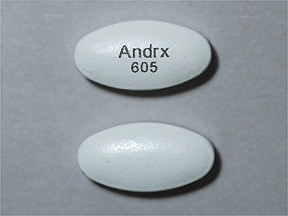
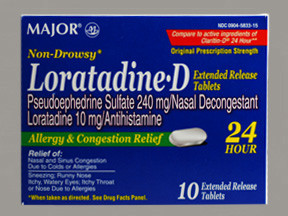
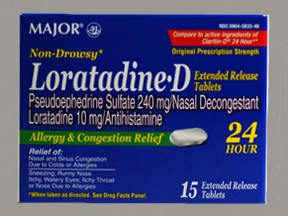
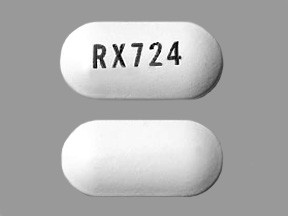
No Reviews Yet